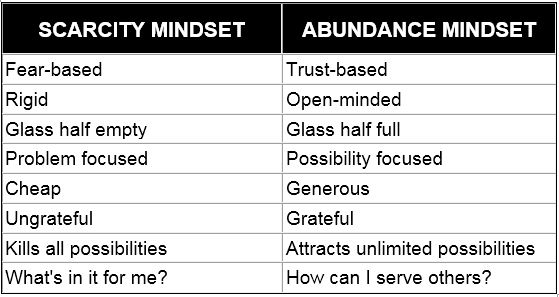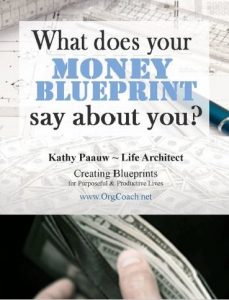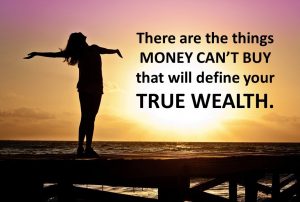I’ve become fascinated by the power of mindset as it relates to one’s relationship with money. Have you ever stopped to think about what mindset rules your life — a scarcity, abundance, or sufficiency mindset?
I grew up in an upper middle-class family. My father earned an income that enabled our family to live very comfortably. Unfortunately, he mismanaged funds and overspent. By the time I was ready to leave home for college, my father had filed for bankruptcy and our family lost everything. There was no money to send me to college.
Despite the lack of funds, I figured out how to put myself through college. Even though I was far from home, I could sense that my parents were operating from a scarcity mindset. Both of them had spent their formative years in lower income households, so this seemed like a shift back to their roots.
Recently I’ve observed the behavior of several people who grew up poor and are now wealthy. For some, the habits and mindset of poverty are not easily erased, even when there is plenty of money. Even though they now live a more abundant life than most, those living with a scarcity mindset may hesitate to pick up a check or leave a generous tip for great service. They may continue to live life from a place of scarcity because denial is so deeply embedded in their DNA. I also know others who grew up poor and are very generous with their abundance today. Their behavior is determined by their mindset.

The reality is, one’s mindset has nothing to do with how much or how little material possessions or money they have.
Your Money Blueprint
In Secrets of the Millionaire Mind, T. Harv Eker notes that each person possesses a “money blueprint” — an internal script for dealing with money — that comprises the lessons we learned in childhood. Most of us have carried those blueprints into adulthood. This is what keeps some people stuck at a certain income level. Their money blueprint is set low. This is also what has enabled Donald Trump to lose millions of dollars and then earn it right back. His money blueprint is set very high.
 Will Smith — famous actor, producer, and multimillionaire — was once asked by Oprah, “How does it feel to be rich?” His answer may surprise you! He confided that at the end of the day, he doesn’t feel rich. He still feels poor! Will Smith cannot shake the way he felt growing up-poor and always struggling for money. He routinely gets anxious and fearful that he’s going to lose everything. Will’s dad taught him to always work hard. As a result, he has a tremendous work ethic, but he never learned how to feel abundance in his life. Even with all his success and wealth, his mind has perpetuated an internal state of “not enough.” His money blueprint was set to “poor and struggling.”
Will Smith — famous actor, producer, and multimillionaire — was once asked by Oprah, “How does it feel to be rich?” His answer may surprise you! He confided that at the end of the day, he doesn’t feel rich. He still feels poor! Will Smith cannot shake the way he felt growing up-poor and always struggling for money. He routinely gets anxious and fearful that he’s going to lose everything. Will’s dad taught him to always work hard. As a result, he has a tremendous work ethic, but he never learned how to feel abundance in his life. Even with all his success and wealth, his mind has perpetuated an internal state of “not enough.” His money blueprint was set to “poor and struggling.”
For a deeper dive on your own money blueprint, I’ve written a guide: What Does Your Money Blueprint Say About You?
How do you define wealth?
The words “money” and “wealth” are often used interchangeably. For some, wealth is defined as the generation of more income or assets to create a better financial position.
I define wealth as an abundance of anything in one’s life that is highly valued. In other words, wealth isn’t just about money.
Money is a tool and it can help you obtain and achieve wealth…but it’s not wealth itself. Although you may think that you value money, it’s not the money itself that you value, but rather the peace of mind and security that money brings, or what you can do with your money that you truly value. That could be something material, an experience, time to spend with a person you care about, or even a feeling.
 What do you need in your life in order to feel truly wealthy? Here are some things I came up with for myself:
What do you need in your life in order to feel truly wealthy? Here are some things I came up with for myself:
- time with my family and friends
- my health
- my freedom
- travel to experience different cultures and interesting destinations
- meaningful contribution through my work and volunteer activities
- gratitude for what I have
“None is more impoverished than the one who has no gratitude. Gratitude is a currency that we can mint for ourselves, and spend without fear of bankruptcy.” –Fred De Witt Van Amburgh
One of my most powerful spiritual practices is to begin each day by expressing gratitude. Gratitude opens the heart so that life-expanding thoughts and ideas can easily enter your consciousness. Regardless of your present life circumstances, there’s always something to be grateful for. What you focus on expands. When you focus on your inner voice, there are no limitations. Limitations only exist through the outer voices and opinions of others, which are typically based on scarcity and limiting beliefs.
Sufficiency
Lynne Twist, author of The Soul of Money, points out that in our Western culture, we incessantly worry about not having enough money. We define our value according to how much we have, we compete with each other for it, and we are addicted to consumption. Money controls us, rather than us controlling it.
Money affects our relationships, is the driving force behind wars, and leads to environmental destruction. The root of our problem with money is a scarcity mindset — a belief that everything is in limited supply – not just money, but material goods, time, power, and love. This mindset afflicts both the rich and the poor, leading to competition, mistrust, exploitation, envy, and a hunger to acquire as much as we possibly can.
When we make a difference with what we have, it expands. Unfortunately, we can never slow down enough to appreciate what we already have, and to let go of trying to get more of what we really don’t need. We’ve learned to value ourselves and others based on external factors rather than inner qualities. Lynne Twist asserts that scarcity is a myth and is a product of our culture. Society’s focus on finance is sapping the spiritual energy that can actually enrich not just individuals, but the world.
The author shares a surprising truth about sufficiency. Here’s an excerpt from The Soul of Money:
We each have the choice in any setting to step back and let go of the mind-set of scarcity. Once we let go of scarcity, we discover the surprising truth of sufficiency. By sufficiency, I don’t mean a quantity of anything. Sufficiency isn’t two steps up from poverty or one step short of abundance. It isn’t a measure of barely enough or more than enough. Sufficiency isn’t an amount at all. It is an experience, a context we generate, a declaration, a knowing that there is enough, and that we are enough.
In our relationship with money, it is using money in a way that expresses our integrity; using it in a way that expresses value rather than determines value. Sufficiency is not a message about simplicity or about cutting back and lowering expectations. Sufficiency doesn’t mean we shouldn’t strive or aspire. Sufficiency is an act of generating, distinguishing, making known to ourselves the power and presence of our existing resources, and our inner resources.
Sufficiency is a context we bring forth from within that reminds us that if we look around us and within ourselves, we will find what we need. There is always enough.
I am not suggesting that there is ample water in the desert or food for the beggards in Bombay. I am saying that even in the presence of genuine scarcity of external resources, the desire and capacity for self-sufficiency are innate and enough to meet the challenges we face. It is precisely when we turn our attentions to these inner resources – in fact, only when we do that – that we can begin to see more clearly the sufficiency in us and available to us, and we can begin to generate effective, sustainable responses to whatever limitations of resources confront us. When we let go of the chase for more, and consciously examine and experience the resources we already have, we discover our resources are deeper than we knew or imagined. In the nourishment of our attention, our assets expand and grow.
–Lynne Twist, The Soul of Money
I invite you to take some time to examine your relationship with money and to identify the mindset you currently have. What possible shifts do you choose to make to improve your relationship with money in your life?
If you’d like a fresh perspective – someone to help you create the mindset you choose to live by — let’s schedule a no-cost, no-pressure Discovery Call today.
Additional Resources
Blog: The Discipline of Gratitude
Guide: What Does Your Money Blueprint Say About You?
Book: Secrets of the Millionaire Mind
Book: The Soul of Money

Life Architect – Creating Blueprints for Purposeful & Productive Lives
Kathy@OrgCoach.net www.OrgCoach.net Follow me on Facebook






Kathy Thank you for this timely blog. I am taking time this morning to take a good look at my own money blueprint.
Good for you, Bonnie. Most people don’t realize how much their own beliefs drive their ability or dis-ability to have a healthy relationship with money.